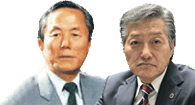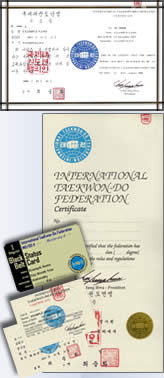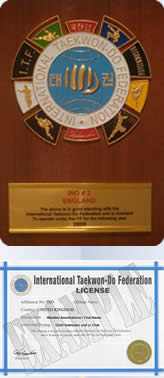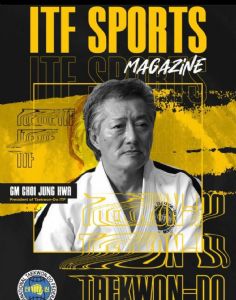| The Unit, Victoria Lane Harlington, Middlesex UB3 5EW United Kingdom |
|


 Write an Article
Write an Article
Do you have an article to submit?
If you are a registered member of the ITF you can add your article, with up to 10 images. You will need to be logged in, and your article will not show until it has been approved.
Instructor Certified?
Instructor / Examiner
In addition to a 4th degree or above cert, Instructors must have passed an IIC to grade students and apply for ITF Certification.

If your unsure please ask to see the Instructor's qualifications. Any reputable ITF Instructor is proud to display the above.
Organisation Certified?
ITF Clubs
If your organisation is in good standing with the ITF they will be listed on our web and have one or both of the following on display:

If your unsure please ask to see the Instructor's and Club's qualifications. Any reputable ITF Clubs or Instructors are proud to display the above.
 BackTaekwon-Do – It’s Really None of your Business
BackTaekwon-Do – It’s Really None of your Business
Written by: Miss Joanna Kruk - 20th March 2006
In consideration of Taekwon-Do in contemporary society, the question arises – can there ever be integration of Taekwon-Do and business, or at a more fundamental level, martial arts and business? The definition of business alone indicates the incompatibility of the two: “An organisation operated in the objective of making profit from the sale of goods and services”. Two aspects of this description immediately contradict the philosophy and purpose of Taekwon-Do, the first of which is the idea of ‘profit’. Of the five tenets, teaching TaeKwon-Do for profit, rather than for the benefit and propagation of General Choi's art, is a violation of integrity.
General Choi, in the first volume of his encyclopaedia, clearly provides business profit as denying the virtue of integrity: “The instructor who promotes his art for materialistic gain [does not show intergrity]”. However, the underlying meaning of this statement may be questioned. General Choi’s statement may be taken to connote any instructor who promotes his art solely for materialistic gain. Oftentimes, an instructor may receive a small sum of money in addition to the reimbursement for hall fees, administration costs etc. However, the problem arises when this minor sum escalates into a large financial reward, which then becomes the motivating factor for the instructor to teach. Thus, the focus of the instructor changes, whereby his objective becomes profit and his Taekwon-Do classes become a service. Too often this is accompanied by the responsibility of teaching classes being handed down to students or inexperienced instructors, leading to a deficit in the quality of the club and ultimately a lower standard and incorrect technique of Taekwon-Do practitioners. The discerning factor between a Taekwon-Do school or a Taekwon-Business then becomes the ‘purpose’ or the ultimate aim of the instructor.
If ‘purpose’ is the underlying dynamic between a ‘Do’ and ‘Business’ school, a dilemma arises. How do we measure or determine an instructors ‘purpose’? This is a cloudy matter. Many advocate that establishing a full-time Taekwon-Do centre is a clear indication of material gain prevailing. Others suggest that any form of profit not returned directly to one’s club signifies a deceitful motivation. Unfortunately the number of instructors teaching reflects the number of different views present. However, three ‘measuring sticks’ have historically been used to determine an instructor’s credibility and thus his purpose. First: success in competitions. This method dates back to 3500 B.C, where competitions (often fought to the death) were used to asses a fighter and his style. The fighter's ‘purpose’ was thus to form a fighting method that would result in victory, his life being at stake. Thus, the fighter must have prepared both mentally and physically, with both aspects being tested in battle. Today, competitions occupy a similar role, however to a significantly less brutal extent. The performance and success of a student represents the instructor's teaching quality, as well as mental training. However, the focus here is on the physical aspects of the student. Taekwon-Do isn’t simply a sport, it is a tradition with a permeating moral culture. It is the second measuring tool – the community – that reflects a Taekwon-Do school's social contribution, and thus the instructor’s virtue. As stated at the beginning of every class in the Taekwon-Do oath ‘I shall build a more peaceful world’. This is one of the primary purposes of Taekwon-Do, and thus should also be that of the instructor. Consequently, the community’s recognition and appreciation of a Taekwon-Do dojang for their public effort is a sign of that club's aim of ‘building a more peaceful world’, and thus adhering to a moral purpose. The final measuring tool for purpose was the founder of the art himself General Choi Hong Hi. His worldly travels served more purpose than simply correcting technique and restating what was in the encyclopaedia. He travelled to monitor not only the physical level of the students, but also their code of conduct which indicated their moral training. His seemingly harsh methods of asking students with poor technique to name their instructor, and then criticising the instructor, was in fact a practice to weed out the lacking and in most cases, business orientated instructors. Again, it was the performance of the students that indicated to the general the ‘purpose’ of their instructor. However, with the recent passing of the General, who is left with this role?
This leader, so desperately required, must not only be knowledgeable in their conduct, but must exercise this knowledge. Of greater significance is that the leader must too have a clearly defined purpose, one far removed from monetary gain. This leader must monitor the purpose of other instructors through the conduction of seminars, meetings with instructors etc. However, they may exercise their role through being a role model – an inspiration. Finally, an integral aspect of this leader would be an extensive knowledge of business ethics and procedure. So, is this a futile search for the ‘perfect’ human? – No, for two reasons. Firstly, a search is not required, as the appropriate candidate, as many would advocate, has already been found. Secondly, perfection isn’t a prerequisite, but a clear and honourable purpose is. As ideal as the leader may be, they too due to human nature, will be bombarded with concepts of materialism, authority and undoubtedly power. Thus, a leader must not work alone, but be accompanied by a strong and trusted cohort of close supporters who share the vision of a fruitful and righteously motivated Taekwon-Do. Equipped with these values and a passionate team, the leader will be able to recognise when the business aspect overrides the ‘Do’ aspect of Taekwon-Do, and as such ensure that purpose remains pure. Thus classifications of business practices that don’t contradict Taekwon-Do philosophy may be made and more importantly scrutinized. However, this code must first be set. Only then will recognising Taekwon-Business’ be possible, and continuing the philosophy that is Taekwon-Do become feasible.
‘Do’ translates to the ‘way’, the connotation being 'a righteous path'. However, this pure way is susceptible to corruption by a myriad of factors ego, power, status, materialism etc. Success in business often requires at least some minimal involvement of these aspects leading, often discretely, to a business orientated individual that has lost their vision of the way, the ‘Do’. This isn’t only limited to full-time gyms, despite its more common presence there, with many part-time instructors increasing training and grading fees, mass grading with reduced time between, recruiting unprepared students to teach at more sites. The measures don’t end there. In doing so, the pure purpose is replaced with business, promoting peace and self defence for safety being replaced with concerns for balances of expenditure and income. This is where the advocated need for a knowledgeable leader who can both set guideline and monitor them is needed. As stated by renowned Zen master His-Tang Chih Tsang “Although gold dust is precious, when it gets in your eyes it obstructs your vision.” Business provides that gold dust that, if not governed, becomes that barrier to attaining the true purpose and goal of Taekwon-Do.
Sorry, but you need to login to your ITF-Administration account to add feedback.
Login now, or if you are not a member then apply to join here

 Log In
Log In



